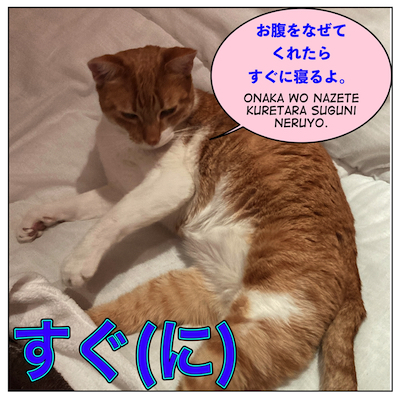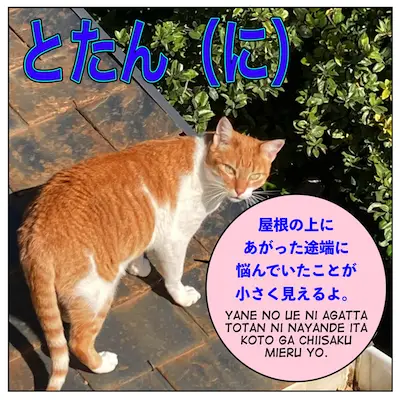
「お腹をなぜてくれたらすぐに寝るよ。」
= おなかをなぜてくれたらすぐにねるよ。
= Onaka wo nazete kuretara sugu ni neru yo.
= If you rub my belly, I’ll fall asleep right away.

「屋根の上にあがったとたんに悩んでいたことが小さく見えるよ。」
= やねのうえにあがったとたんになやんでいたことがちいさくみえるよ。
= Yane no ue ni agatta totan ni nayande ita koto ga chiisaku mieru yo.
= As soon as I got up on the roof, my worries seemed small.
Hi everyone! I’m Gordo. I am back to teach you some more Japanese. 😸
Today we are going to learn how to use すぐ(に) = sugu ( ni) and 途端(に)= とたん(に) = totan (ni)
🔵 すぐに (直ぐに)= sugu ni
⭐️How to form:
1) すぐに = sugu ni /すぐ = sugu + verb
→すぐ(に) 行きます = すぐ(に) いきます = sugu (ni) ikimasu
= I’ll go right away.
→すぐ(に) 行きました = すぐ(に) いきました
= I went ~ right away.
2) verb te-form ~て ( = te) + (から = kara) )+ すぐ(に)( = sugu (ni))
= right after doing something / as soon as one does something
→ 起きてからすぐ(に)= おきてからすぐ(に)= okite kara sugu (ni)
= right after waking up / as soon as waking up
or 起きてすぐ(に) = おきてすぐ(に) = oki te sugu (ni)
verb te-form ~て (= te) + (から = kara) )+ すぐ ( = sugu) + の ( = no) + noun
→ 卒業して(から)すぐの頃 = そつぎょうして(から)すぐのころ = sotsugyou shite (kara) sugu no koro
= shortly after graduation
3) verb dictionary form + と ( = to) + すぐ(に)( = sugu ( ni) / verb masu-stem + たら ( = tara) + すぐ(に) ( = sugu (ni))
→as soon as ~
→帰るとすぐ = かえるとすぐ = kaeru to sugu
= as soon as I/we/you get home/right after returning home
→帰ったらすぐ = かえったらすぐ = kaettara sugu
= as soon as I/we/you get home/right after returning home
4) (Indicating a short distance)
motion verb て ( = te) + すぐ ( = sugu)
→歩いてすぐ = あるいてすぐ = aruite sugu = a short walk away
🔸motion verb て ( = te) + すぐ ( = sugu) + の ( = no) + noun
→歩いてすぐのところ = あるいてすぐのところ = aruite sugu no tokoro
= a place that’s a short walk away.
🔸 noun + から ( = kara) + すぐ ( = sugu) = very near
→ 家からすぐ = いえからすぐ = ie kara sugu
= right near the house
🔸noun + から ( = kara) + すぐ ( = sugu) + の ( = no) + noun
→ 駅からすぐの距離 = えきからすぐのきょり = eki kara sugu no kyori = a short distance from the station
⭐️How to use:
1) すぐに ( = sugu ni) /すぐ ( = sugu) + verb : to do something soon/quickly/right away/immediately
Ex. すぐにそちらに行きます。
= すぐにそちらにいきます。
= Sugu ni sochira ni ikimasu.
= I’ll be there right away.
Note: We tend to omit に (= ni) in casual conversation.
Ex. すぐ行くよ。
= すぐいくよ。
= Sugu iku yo.
When you want to emphasize “right away,” even in casual conversation, you should include に ( = ni)
Ex. この間貸した本、すぐに返して。
= このあいだかしたほん、すぐにかえして。
= Kono aida kashita hon, sugu ni kaeshite.
= Return the book I lent you the other day right away.
Ex. 起きてからすぐに甘いものは食べない方がいいよ。
= おきてからすぐにあまいものはたべないほうがいいよ。
= Okite kara sugu ni amai mono wa tabenai hou ga ii yo.
= It’s better not to eat sweet things right after you wake up.
Ex. この料理は簡単だからすぐにできますよ。
= このりょうりはかんたんだからすぐにできますよ。
= Kono ryouri wa kantan dakara sugu ni dekimasu yo.
= This dish is easy, so you can make it quickly.
Ex. 買ったばかりの充電器がすぐに壊れた。
= かったばかりのじゅうでんきがすぐにこわれた。
= Katta bakari no juudenki ga sugu ni kowareta.
= The charger I just bought broke right away.
Ex. 何か困ったことがあったらすぐに駆けつけますからね。
= なにかこまったことがあったらすぐにかけつけますからね。
= Nani ka komatta koto ga attara sugu ni kaketsukemasu ne.
= If you have any trouble, I’ll come to help right away.
Ex. うちの子は、新しいゲームを買ってあげてもすぐに飽きる。
= うちのこは、あたらしいゲームをかってあげてもすぐにあきる。
= Uchi no ko wa, atarashii geemu wo katte agete mo sugu ni akiru.
= Even if I buy my kid a new game, he/she get bored with it right away.
Ex. 客: 「あの…まだ注文したものが来ていないんですが…」
= きゃく: あの…まだちゅうもんしたものがきていないんですが…
= Kyaku: Ano…mada chuumon shita mono ga kite inain desu ga…
= Customer: “Excuse me, but my order hasn’t come yet…”
お店の人:「申し訳ございません。今すぐお持ちいたします。」
= おみせのひと: もうしわけございません。いますぐおもちいたします。
= Omise no hito: Moushiwake gozaimasen. Ima sugu omochi itashimasu.
= Staff: “I apologize. I’ll bring it right away.”
Ex. ここの寿司屋は、いつも混んでいるけど、今日はすぐに入れた。
= ここのすしやは、いつもこんでいるけど、きょうはすぐにはいれた。
= Kono sushiya wa, itsumo konde iru kedo, kyou wa sugu ni haireta.
= This sushi restaurant is usually crowded, but we got in right away today.
Ex. 駅に着いたらすぐに連絡してね。
= えきについたらすぐにれんらくしてね。
= Eki ni tsuitara sugu ni renraku shite ne.
= Contact me as soon as you get to the station.
Ex. 新しい仕事にもすぐに慣れた。
= あたらしいしごとにもすぐになれた。
= Atarashi shigoto ni mo sugu ni nareta.
= I got used to my new job quickly.
Ex. 子供の頃、家に帰るとすぐに友達の家に遊びに行っていたものだ。
= こどものころ、いえにかえるとすぐにともだちのいえにあそびにいっていたものだ。
= Kodomo no koro, ie ni kaeru to sugu ni tomodachi no ie ni asobini itta mono
da.
= When I was a child, I would go to a friend’s house to play as soon as I got
home.
Ex. 今、辛いことがあってもすぐに忘れるから大丈夫!
= いま、つらいことがあってもすぐにわすれるからだいじょうぶ!
= Ima, tsurai koto ga atte mo sugu ni wasureru kara daijoubu !
= Even if you are going through something tough right now, you’ll forget about
it soon, so you will be just fine!
Ex. 20年ぶりに会ったのにすぐに彼女だとわかった。
= にじゅうねんぶりにあったのにすぐにかのじょだとわかった。
= Nijuunen buri ni atta no ni sugu ni kanojo da to wakatta .
= Even though I hadn’t seen her in 20 years, I recognized her immediately.
Note: もうすぐ = mousugu = very soon, in a little whileSome actions/events are going to happen very soon but not necessarily right at this moment.
Ex. もうすぐ春が来る。
= もうすぐはるがくる。
= Mousugu haru ga kuru
= Spring is coming soon.
Ex. 子供達はもうすぐ帰ってきます。
= こどもたちはもうすぐかえってきます。
= Kodomotachi wa mousugu kaette kimasu.
= The children will be be back soon.
2) verb te-form ~て ( = te) + (から = kara) )+ すぐ(に)( = sugu (ni))
= right after doing something / as soon as one does something
Ex. 大学に行ってからすぐに友達ができた。
= だいがくにいってからすぐにともだちができた。
= Daigaku ni itte kara sugu ni tomodachi ga dekita.
= I made friends right after I went to university.
Ex. ベッドに入ってすぐに寝られる人がうらやましい。
= ベッドにはいってすぐにねられるひとがうらやましい。
= Beddo ni haitte sugu ni nerareru hito ga urayamashii.
= I envy people who can fall asleep as soon as they get into bed.
Ex. 空港に着いてからすぐにeSIMに切り替えてください。
= くうこうについてからすぐにeSIMにきりかえてください。
= Kuukou ni tsuite kara sugu ni eSIM ni kirikaete kudasai.
= Please switch to an eSIM as soon as you get to the airport.
🔸 verb te-form ~て ( = te) + (から = kara)+ すぐ ( = sugu) + の ( = no) + noun = right after doing something
Ex. 新しい会社に入ってすぐの時に上司にご馳走になった。
= あたらしいかいしゃにはいってすぐのときにじょうしにごちそうになった。
= Atarashii kaisha ni haitte sugu no toki ni joushi ni gochisou ni natta.
= Soon after joining the new company, my boss treated me to a meal.
Ex. 生まれてすぐの赤ちゃんの写真が友達から送られてきた。
= うまれてすぐのあかちゃんのしゃしんがともだちからおくられてきた。
= Umarete sugu no akachan no shashin ga tomodachi kara okurarete kita.
= My friend sent me a photo of their newborn baby.
(The literal translation: A photo of a baby right after being born was sent to me by my friend.)
3) verb dictionary form + と ( = to) + すぐ(に)( = sugu ( ni) /
verb masu-stem + たら ( = tara) + すぐ(に) ( = sugu (ni))
→as soon as ~
Ex. 彼女にプレゼントをあげるとすぐにお返しが送ってくる。
= かのじょにプレゼントをあげるとすぐにおかえしがおくってくる。
= Kanojo ni purezento wo ageru to sugu ni okaeshi ga okutte kuru.
= As soon as I give her a present, she immediately sends a gift in return.
Note: When you talk about the routine or habit, you use と
Ex. 博多に着いたらすぐに美味しいラーメンを食べに行きたい。
= はかたについたらすぐにおいしいラーメンをたべにいきたい。
= Hakata ni tsuitara sugu ni oishii raamen wo tabeni ikitai.
= As soon as I arrive in Hakata, I want to go eat some delicious ramen.
📝Note: You don’t use とすぐ(に) ( = to sugu (ni) when you are talking about the future, expressing your desire, what you want to do or your intention, telling someone what to do.
→❌ 博多に着くとすぐに美味しいラーメンを食べに行きたい。(wrong)
= はかたにつくとすぐにおいしいラーメンをたべにいきたい。
= Hakata ni tsuku to sugu ni oishii raamen wo tabeni ikitai
Ex. おやつを食べたらすぐに宿題をしなさいよ。
= おやつをたべたらすぐにしゅくだいをしなさいよ。
= Oyatsu wo tabetara sugu ni shukudai wo shinasai yo.
= Do your homework as soon as you finish your snack, OK?
Note: You don’t use とすぐ(に) ( = so sugu (ni)) when you tell someone what to do.
❌ おやつを食べるとすぐに宿題をしなさいよ。(wrong)
= おやつをたべるとすぐにしゅくだいをしなさいよ。
= Oyatsu wo taberu to sugu ni shukudai wo shinasai yo.
Ex. 今の仕事が終わると/終わったらすぐに次の仕事が待っている。
= いまのしごとがおわると/終わったらすぐにつぎのしごとがまっている。
= Ima no shigoto ga owaru to / owattara sugu ni tsugi no shigoto ga matte iru.
= As soon as I finish my current task, the next one is waiting for me.
Ex. 先生は、私が日本語を間違えたら/間違えるとすぐに直してくれる。
= せんせいは、わたしがにほんごをまちがえたら/まちがえるとすぐになおしてくれる。
= Sensei wa, watashi ganihongo wo machigaetara/machigaeru to sugu ni naoshite kureru.
= My teacher corrects me as soon as I make a mistake in Japanese.
4) (Indicating a short distance)
🔸motion verb て ( = te) + すぐ ( = sugu)
→to describe something that is very close or immediately accessible by actions like walking, crossing, turning, etc.
Ex. A: 「すみません。歌舞伎座*はどこですか?」
= A: すみません、かぶきざはどこですか?
= Sumimasen, Kabukiza wa doko desu ka?
= A: “Excuse me, where is Kabukiza (Kabuki Theater)?”
B: 「ここから歩いてすぐですよ。」
= B: ここからあるいてすぐですよ。
= B: Koko kara aruite sugu desu yo.
= B: “It’s just a short walk from here.”
Ex. 交番は、突き当たりを曲がってすぐです。
= こうばんは、つきあたりをまがってすぐです。
= Kouban wa, tsukiatari wo magatte sugu desu.
= The police box is at the end of the road just after the turn.
Ex. 京都タワーは駅を出てすぐです。
= きょうとタワーはえきをでてすぐです。
= Kyouto tawaa wa eki wo dete sugu desu.
= Kyoto Tower is right outside the station exit.
🔸 motion verb て ( = te) + すぐ ( = sugu) + の ( = no) + noun
Ex. ホテルを出てすぐのところにコンビニがあります。
= ホテルをでてすぐのところにコンビニがあります。
= Hoteru wo dete sugu no tokoro ni konbini ga arimasu.
= There’s a convenience store outside near the hotel.
Ex. A: 「まだ遠いの?」(casual)
= A: まだとおいの?
= A: Mada tooi no?
= A: “Are we there yet?”
B: この角を曲がってすぐのところだよ。(casual)
= このかどをまがってすぐのところだよ。
= Kono kado wo magatte sugu no tokoro dayo.
= “It is just around this corner.”
🔸 noun + から ( = kara) + すぐ ( = sugu9 / noun + から ( = kara) + すぐ ( = sugu) + の ( = no) + noun: near/close to ~
→to indicate something is very close right after a specific point or place.
Ex. 東京からすぐ行ける温泉はどこですか?
= とうきょうからすぐいけるおんせんはどこですか?
= Toukyou kara sugu ikeru onsen wa doko desu ka?
= Where is a hot spring that’s easy to get to from Tokyo?
Ex. 空港からすぐのホテルを予約した。
= くうこうからすぐのホテルをよやくした。
= Kuukou kara sugu no hoteru wo yoyaku shita.
= I booked a hotel that is very close to the airport.
Ex. 駅からすぐのところに住んでいます。
= えきからすぐのところにすんでいます。
= Eki kara sugu no tokoro ni sunde imasu.
= I live just a short distance from the station.
⭐️With other particles:
* すぐには ( = sugu niwa) in a negative sentence:
You often attach は to emphasize the point in a negative sentence.
Ex. なんでも練習しなければすぐにはうまくならない。
= なんでもれんしゅうしなければすぐにはうまくならない。
= Nandemo renshuu shinakereba sugu niwa umaku naranai.
= You won’t get good at anything right away unless you practice.
/You won’t see any immediate improvement at anything unless you practice.
Ex. 申し訳ありませんがその件についてすぐにはお答えできません。(polite)
= もうしわけありませんがそのけんについてすぐにはおこたえできません。
= Moushiwake arimasen ga sono ken ni tsuite sugu niwa okotae dekimasen.
= I’m sorry, but I can’t respond to that matter right away.
* すぐにでも ( = sugu ni demo) / 今すぐにでも = いますぐにでも = ima sugu ni demo: To emphasize the urgency or immediacy of an action.
Ex. 今すぐにでも彼に会いに行きたい。
= いますぐにでもかれにあいにいきたい。
= Ima sugu ni demo kare ni ai ni ikitai.
= I want to go see him right away.
***
🔵 途端(に) = とたん(に) = totan (ni)
⭐️How to form:
🔸 verb casual form (past tense) ~ た ( = ta) + 途端(に) = とたん(に) = totan (ni)
→見た途端(に)= みたとたん(に) = mita tonan (ni)
or
🔸verb masu-stem + たら ( = tara) + 途端に ( = とたんに = totan ni)
→見たら途端(に) = みたらとたん(に)= mitara totan (ni)
⭐️How to use:
途端(に) ( = とたん(に) = totan (ni)) means “as soon as ~ / just as ~ / just when ~ / the moment ~”
It describes an immediate action or change that occurs right after another action. It often involves a sense of surprise or unexpectedness.
Ex. 疲れていたので映画が始まった途端、寝てしまった。
= つかれていたのでえいががはじまったとたん、ねてしまった。
= Tsukarete ita no de eiga ga hajimatta totan, nete shimatta.
= I was tired, so I fell asleep as soon as the movie started.
Ex. 妹は、デートから帰ってきた途端、相手の文句を言い始めた。
= いもうとは、デートからかえってきたとたん、あいてのもんくをいいはじめた。
= Imouto wa, deeto kara kaette kita totan, aite no monku wo iihajimeta.
= As soon as my little sister came back from the date, she started complaining about her date.
Ex. ドアを開けた途端、犬が飛びついて来た。
= ドアをあけたとたん、いぬがとびついてきた。
= Doa wo aketa totan, inu ga tobitsuite kita.
= The moment I opened the door, the dog jumped at me.
It often indicates that one action serves as a trigger or sign for another action.
~た途端に ( = ~たとたんに = ~ ta totan ni)(A) + something happened/someone did something (B)
(B) happened immediately after (A)
(A) serves as the trigger or cause for (B) to happen.
Ex. そのファイルを開いた途端に、画面がフリーズした。
= そのファイルをひらいたとたんに、がめんがフリーズした。
= Sono fairu wo hiraita totan ni, gamen ga furiizu shita.
= The moment I opened that file, the screen froze.
Ex. 子供達は、大好きな曲が流れた途端に踊り始めた。
= こどもたちは、だいすきなきょくがながれたとたんにおどりはじめた。
= Kodomotachi wa, daisukina kyoku ga nagareta totan ni odori hajimeta.
=The children started dancing as soon as their favorite song began to play.
Ex. 母の顔を見た途端、安心して泣いてしまった
= ははのかおをみたとたん、あんしんしてないてしまった。
= Haha no kao wo mita totan, anshin shite naite shimatta.
= The moment I saw my mother’s face, I felt relieved and cried.
Ex. 彼女は二人になった途端に黙りこくってしまった。
= かのじょはふたりになったとたんにだまりこくってしまった。
= Kanojo wa futari ni natta totan ni damarikokutte shimatta.
= The moment we were alone, she went completely silent.
Ex. 上司が話し始めた途端、みんな静かになった。
= じょうしがはなしはじめたとたん、みんなしずかになった。
= Joushi ga hanashihajimeta totan, minna shizuka ni natta.
= As soon as the boss started talking, everyone became quiet.
Ex. マギー先生にもっとレッスンを作って下さいと言ったら途端に寝たふりをした。
= マギーせんせいにもっとレッスンをつくってくださいといったらとたんにねたふりをした。
= Maggie Sensei ni motto ressun wo tsukutte kudasai to ittara totan ni neta furi wo shita.
= The moment I told Maggie Sensei to make more lessons, she pretended to be asleep.
Ex. マギーに会った途端に一目惚れした。
= マギーにあったとたんにひとめぼれした。
= Maggi ni atta totan ni hitomebore shita.
= The moment I met Maggie, it was love at first sight.
Ex. 付き合った途端に態度を変える人は信用ができない。
= つきあったとたんにたいどをかえるひとはしんようができない。
= Tsukiatta totan ni taido wo kaeru hito wa sinyou ga dekinai.
= I can’t trust someone who changes their attitude the moment we start dating.
Ex. 立ち上がった途端にめまいがした。
= たちあがったとたんにめまいがした。
= Tachiagatta totan ni memai ga shita.
= I felt dizzy as soon as I stood up.
⭐️From the picture above:
「屋根の上にあがったとたんに悩んでいたことが小さく見えるよ。」
= やねのうえにあがったとたんになやんでいたことがちいさくみえるよ。
= Yane no ue ni agatta totan ni nayande ita koto ga chiisaku mieru yo.
= As soon as I got up on the roof, my worries seemed small.
******
🗒️ Note: The difference between すぐに (= sugu ni) and 途端に ( = とたんに = totan ni )
Ex. 家を出た途端に雨が降り始めた。
= いえをでたとたんにあめがふりはじめた。
= Ie wo deta totan ni ame ga furihajimeta.
= As soon as I left home, it began to rain.
or
→家を出たら途端に雨が降り始めた。
= いえをでたらとたんにあめがふりはじめた。
= Ie wo detara totan ni ame ga furihajimeta.
You can rephrase them
→家を出るとすぐに雨が降り始めた。
= いえをでるとすぐにあめがふりはじめた。
= Ie wo deru to sugu ni ame ga furihajimeta.
= As soon as I left home, it began to rain.
or
→家を出たらすぐに雨が降り始めた。
= いえをでたらすぐにあめがふりはじめた。
= Ie wo detara sugu ni ame ga furi hajimeta.
Both 途端に (= とたんに = totan ni ) and すぐに ( = sugu ni) mean “as soon as ~ “
The difference is:
途端に (とたんに = totan ni) is used for things that happen suddenly and unexpectedly, usually things you can’t control.
You don’t use 途端に (とたんに = totan ni) when you intentionally do something in the future.
すぐに ( = sugu ni ) can be used for both things you can control and things you can’t control
(Ex. 雨が降り始めた = あめがふりはじめた = Ame ga furihajimeta = It began to rain).
It also includes intentional actions and can be used to talk about things in the future.
For example:
* Expressing one’s intentions in the following sentence:
Ex. 家に着いたらすぐに電話をかけます。
= いえについたらすぐにでんわをかけます。
= Ie ni tsuitara sugu ni denwa wo kakemasu.
= I will call you as soon as I get home.
⚠️You can’t say:
❌家に着いた途端に電話をかけます。(wrong)
= いえについたとたんにでんわをかけます。
= Ie ni tsuita totan ni denwa wo kakemasu.
* Telling someone what to do in the following sentence
Ex. 帰ったらすぐに電話をください。
= かえったらすぐにでんわをください。
= Kaettara sugu ni denwa wo kudasai
= Please call me as soon as you get home.
⚠️You can’t say
❌帰った途端に電話をください。(wrong)
= かえったとたんにでんわをください。
= Kaetta totan ni denwa wo kudasai.
* Describing someone’s behavior.
Ex. 彼は家に着いたらすぐに/着くとすぐにお風呂に入った。
= かれはいえについたらすぐに/つくとすぐにお風呂に入った。
= Kare wa ie ni tsuitara sugu ni/ tsuku to sugu ni ofuro ni haitta.
= He took a bath as soon as he got home.
→△彼は家に着いた途端にお風呂に入った。
= かれはいえについたとたんにふろにはいった。
= Kare wa ie ni tsuita totan ni furo ni haitta.
It sounds a bit awkward since calling someone is usually a controlled action.
It only works if the speaker/writer thinks his behavior is something unexpected.
****
 マギー先生より = マギーせんせいより = Maggie Sensei yori = From Maggie Sensei
マギー先生より = マギーせんせいより = Maggie Sensei yori = From Maggie Sensei
Gordo先生、また来てくれてありがとう!
= Gordoせんせい、またきてくれてありがとう!
= Gordo Sensei, mata kite kurete arigatou!
= Thank you for coming back, Gordo Sensei!
このレッスンを読んだらすぐに、「途端に」と「すぐに」を使ってみてね。
= このレッスンをよんだらすぐに、「とたんに」と「すぐに」をつかってみてね。
= Kono ressun wo yondara sugu ni, TOTAN NI to SUGUNI wo tsukatte mitene.
= Now that you’ve finished this lesson you should try using TOTAN NI and SUGI NI right away.
*****
My Patrons can access the audio file
Audio Files for this lesson →Click here
PDF file without ads (One with romaji & One without romaji) →Click here
I appreciate your support! サポートありがとう! !
My supporters can access tons of audio files, PDF files, and special lessons on my Patreon page.
❤️ありがとう x 2: Minilessons, Audio files for all the lessons here from 2018,
❤️ありがとう x 5 In addition to the previous benefit + Daily Japanese
Check the index of Daily Japanese Series →Index
❤️ありがとう x 10 In addition to the previous benefit + PDF file of all my Twitter lessons for a month (average 10 ~ 18 pages) with an audio file. Please check the details here
One-time support ↓ ありがとう!


